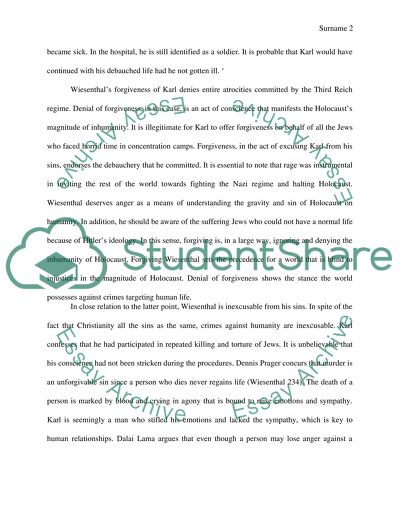Cite this document
(“Analysis of The Sunflower - on the Possibilities and Limits of Book Report/Review”, n.d.)
Analysis of The Sunflower - on the Possibilities and Limits of Book Report/Review. Retrieved from https://studentshare.org/literature/1661870-in-an-essay-summarize-the-dilemma-wiesenthal-confronts-and-then-take-a-position-answering-the-critical-question-what-would-you-have-done-either-forgiving-the-soldier-or-refusing-forgiveness-and-discuss-the-reasons-that-you-have-chosen-your-sta
Analysis of The Sunflower - on the Possibilities and Limits of Book Report/Review. Retrieved from https://studentshare.org/literature/1661870-in-an-essay-summarize-the-dilemma-wiesenthal-confronts-and-then-take-a-position-answering-the-critical-question-what-would-you-have-done-either-forgiving-the-soldier-or-refusing-forgiveness-and-discuss-the-reasons-that-you-have-chosen-your-sta
(Analysis of The Sunflower - on the Possibilities and Limits of Book Report/Review)
Analysis of The Sunflower - on the Possibilities and Limits of Book Report/Review. https://studentshare.org/literature/1661870-in-an-essay-summarize-the-dilemma-wiesenthal-confronts-and-then-take-a-position-answering-the-critical-question-what-would-you-have-done-either-forgiving-the-soldier-or-refusing-forgiveness-and-discuss-the-reasons-that-you-have-chosen-your-sta.
Analysis of The Sunflower - on the Possibilities and Limits of Book Report/Review. https://studentshare.org/literature/1661870-in-an-essay-summarize-the-dilemma-wiesenthal-confronts-and-then-take-a-position-answering-the-critical-question-what-would-you-have-done-either-forgiving-the-soldier-or-refusing-forgiveness-and-discuss-the-reasons-that-you-have-chosen-your-sta.
“Analysis of The Sunflower - on the Possibilities and Limits of Book Report/Review”, n.d. https://studentshare.org/literature/1661870-in-an-essay-summarize-the-dilemma-wiesenthal-confronts-and-then-take-a-position-answering-the-critical-question-what-would-you-have-done-either-forgiving-the-soldier-or-refusing-forgiveness-and-discuss-the-reasons-that-you-have-chosen-your-sta.


